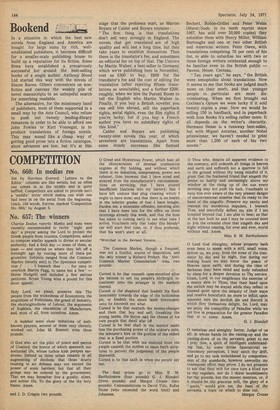Bookend
In a situation in which the best new novels from England and America are bought for large sums by rich, wellestablished publishers, it becomes difficult for a smaller-scale publishing house to build up a reputation for its fiction, Some firms have established a precariously successful list around the best-selling books of a single author. Anthony Blond Ltd started this way with the novels of Simon Raven. Others concentrate on nonfiction and canvass the weekly pile of novel manuscripts in an unhopeful search for something readable.
The alternative, for the missionary band of publishers, most of them supported in a small way by the Arts Council, who refuse to push out twenty lending-library romances in order to be able to afford one John Fowles or Kurt Vonnegut, is to produce translations of foreign noyels. This may sound like a cheap way of . getting good prose into a fiction catalogue, since advances are low, but it's at this stage that the problems start, as Marion Boyars of Calder and Boyars explains : "The first thing is that translations don't sell very strongly in England. The novels that get translated are of high quality and will last a long time, but they take years to establish themselves. Then there is the translator's fee, and sometimes an editorial fee on top of that. Thie Unicorn by Martin Walser, a best-seller M Germany which we're publishing here in November, cost us £3Q0 to buy, £600 for the translator's fee and the cost of editing the translation (after rejecting fifteen translations as unsuitable), and a further £200, roughly, when we hire the Purcell Room to tell the English who Martin Walser is. Finally, if you buy a British novelist you can sell him abroad, sell the paperback rights, serial rights, even the film rights if you're. lucky; but if you buy a French author you have no subsidiary rights of this kind."
Calder and Boyars are publishing twenty-nine novels this year, of which seventeen are translations. Apart from some steady successes like Samuel Beckett, Robbe-Grillet and Peter Weiss (Marat/Sade, in its tenth reprint since 1967, has sold over 20,000 copies) they subsidise them with Henry Miller, William Burroughs and one or two other British and American writers. Peter Owen, with translations comprising 70 per cent of his list, is able to subsidise his with two or three foreign writers celebrated enough to be familiar even to the British public — Pavese, Hesse, Cocteau.
"Ten years ago," he says, "the British were xenophobic about translations. Now it seems to me that books are judged much more on their merit, and that younger people in particular are more discriminating. When we first brought out Cocteau's Opium we were lucky if it sold twenty copies a year. Now we would be selling 150 in hardback, and in paperback with Icon Books it's selling rather more. It all depends on the writer's obscurity. Hermann Hesse is a runaway best-seller, but with Miguel Asturias, another Nobel prizewinner, we haven't needed to print more than 1,200 of each of his two novels."










































 Previous page
Previous page